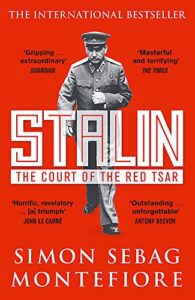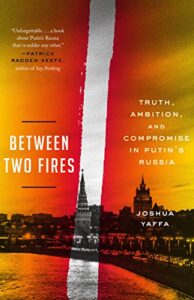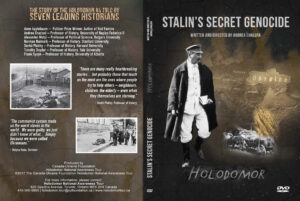 Stalin was a Marxist, while Putin is a 21st-century tyrant, populist and nationalist, a practitioner of 21st-century identity politics who deploys old-fashioned military heavy metal and the new hi-tech weaponry of social media, says Simon Sebag Montefiore, whose books include Stalin: the Court of the Red Tsar.
Stalin was a Marxist, while Putin is a 21st-century tyrant, populist and nationalist, a practitioner of 21st-century identity politics who deploys old-fashioned military heavy metal and the new hi-tech weaponry of social media, says Simon Sebag Montefiore, whose books include Stalin: the Court of the Red Tsar.
Yet Stalin could not be more relevant. Stalin’s influence is imprinted everywhere in the state structure of Russia; he remains omnipresent. Putin’s repression at home increasingly resembles Stalinist tyranny – in its cult of fear, rallying of patriotic displays, crushing of protests, brazen lies and total control of media – although without the mass deportations and mass shootings. So far, he writes for The New Statesman:
Then there is Ukraine, a country that was brutally repressed by Stalin and now attacked by Putin. The Russian president shares a part of Stalin’s determination to liquidate the nationality and independence of Ukraine at any cost. The differences between the two are as great as the similarities, Montefiore adds:
- Stalin was a Georgian, born with the surname Dzhugashvili. Putin, born in Leningrad, emphasised in the early days of the invasion of Ukraine “I’m a Russian”.
- Stalin was a fanatical internationalist Marxist; Putin believes in the exceptionalist “Russian world” starting with the Orthodox conversion of Vladimir the Great in 988.
- He despises Marxist ideology, believing the Leninist revolution shattered Russian imperium. Eschewing Communism, he promotes Kremlin-KGB-capitalism.
- Stalin, who had no interest in money and only possessed a couple of uniforms (though he enjoyed the use of comfortable mansions) would be disgusted by the vulgarity of the yachts and planes of Russia’s ultra-rich.
Stalin presided over a growing economy. However murderously, he drew on a real ideology. Even as he committed outrages, he consolidated the Soviet empire. After being attacked by Nazi Germany, he was saved by the unbelievable sacrifice of his country, which did more than any other to win the war, The Economist reports:
Mr Putin has none of those advantages. Not only is he failing to win a war of choice while impoverishing his people: his regime lacks an ideological core. “Putinism”, such as it is, blends nationalism and orthodox religion for a television audience. Russia’s regions, stretched across 11 time zones, are already muttering about this being Moscow’s war.
Vladimir Putin’s dictatorship – The Stalinisation of Russia https://t.co/G6skFtPymy
— Democracy Digest (@demdigest) March 10, 2022
It is easy to dismiss Putin’s claim of the World War II legacy as senseless. Even as he imitates the men who began that war, he claims to be engaged in “de-Nazification,” adds Yale University historian Timothy Snyder. Ukraine is a democracy whose voters elected a Jewish president by more than 70 percent of the vote in 2019. But Putin’s program of “de-Nazification” is not a misunderstanding of the world but a deliberate perversion meant to alter it. It is based on totalitarian assumptions about how language works, he writes for Foreign Policy:
As Hannah Arendt pointed out in her book Origins of Totalitarianism, a big lie is a kind of challenge to reality, which is to be bent by violence. Killing a Jewish president and destroying Ukrainian democracy in the name of “de-Nazification” would show that words mean whatever the leader says they mean. The moral language of World War II is being claimed for a revival of totalitarianism.
 In his unsettling 2021 book, Between Two Fires: Truth, Ambition, and Compromise in Putin’s Russia, The New Yorker’s Moscow correspondent Joshua Yaffa gathers profiles of Russians who have ceded some of their ethics and freedoms to Putin, The LA Times reports. Foremost is Konstantin Ernst, a brilliant TV producer and intellectual who transformed and burnished Putin’s video image, attending high-level Kremlin meetings while running a national news channel broadcasting pro-Putin news and entertainment with a nostalgic view of Russia’s Stalinist past.
In his unsettling 2021 book, Between Two Fires: Truth, Ambition, and Compromise in Putin’s Russia, The New Yorker’s Moscow correspondent Joshua Yaffa gathers profiles of Russians who have ceded some of their ethics and freedoms to Putin, The LA Times reports. Foremost is Konstantin Ernst, a brilliant TV producer and intellectual who transformed and burnished Putin’s video image, attending high-level Kremlin meetings while running a national news channel broadcasting pro-Putin news and entertainment with a nostalgic view of Russia’s Stalinist past.
A Ukraine that is heading towards democratic freedom, the rule of law and integration with the West particularly galls Putin because Ukraine is ethnically Slavic and primarily Orthodox in religion, like Russia, says Stanford historian Norman Naimark. a co-author of Stalin’s Secret Genocide – Ukraine’s Holodomor. It shares the Russians’ own Soviet and Imperial past and therefore should be complicit, in Putin’s view, in Moscow’s anti-democratic ideology.
‘Time bomb” under the state
 In 2016, Putin issued a searing condemnation of Lenin’s concept of a federative state which gave entities the right to secede, not least because it contributed to the 1991 dissolution of the Soviet Union. “It was a time bomb under our state,” he said, adding that Lenin’s was wrong to dispute Stalin’s model of a unitary state.
In 2016, Putin issued a searing condemnation of Lenin’s concept of a federative state which gave entities the right to secede, not least because it contributed to the 1991 dissolution of the Soviet Union. “It was a time bomb under our state,” he said, adding that Lenin’s was wrong to dispute Stalin’s model of a unitary state.
Putin’s decision [to invade Ukraine] is rational – within his own distorted world-view – but it’s a colossal gamble to secure his legacy, change the course of history and restore a Russian empire in this new hi-tech interconnected world, Montefiore observes:
As this atrocious war and Western sanctions corrode Russian society, Stalinist terror will become essential to Putin’s hold on power. If Putin loses he may be deposed by his own courtiers – tsars and general secretaries are usually destroyed by palace coups not protests – but he could also survive, as Saddam Hussein did after two defeats. If Putin wins, he joins Peter the Great and Stalin in the histories. “Victors,” said Stalin, “are never tried.”
As Russia sinks, the contrast with the president next door is glaring, The Economist adds. Mr Putin is isolated and morally dead; Mr Zelensky is a brave Everyman who has rallied his people and the world. He is Mr Putin’s antithesis—and perhaps his nemesis. Think what Russia might become once freed from its 21st-century Stalin
Every Russian has learned about the Siege of Leningrad during World War II. Sadly, history has repeated itself—but now it’s the Russian government cruelly starving Ukrainian cities. pic.twitter.com/wjG3IgwAzH
— Secretary Antony Blinken (@SecBlinken) March 9, 2022







